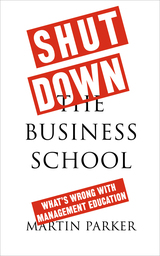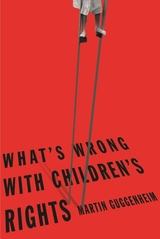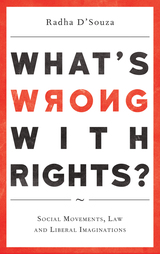

"Children's rights": the phrase has been a legal battle cry for twenty-five years. But as this provocative book by a nationally renowned expert on children's legal standing argues, it is neither possible nor desirable to isolate children from the interests of their parents, or those of society as a whole.
From foster care to adoption to visitation rights and beyond, Martin Guggenheim offers a trenchant analysis of the most significant debates in the children's rights movement, particularly those that treat children's interests as antagonistic to those of their parents. Guggenheim argues that "children's rights" can serve as a screen for the interests of adults, who may have more to gain than the children for whom they claim to speak. More important, this book suggests that children's interests are not the only ones or the primary ones to which adults should attend, and that a "best interests of the child" standard often fails as a meaningful test for determining how best to decide disputes about children.

Copyright law, as conventionally understood, serves the public interest by regulating the production and dissemination of works of authorship, though it recognizes that the requirements of the public interest are in tension. Incentives for creation must be provided, but protections granted authors must not prevent the fruits of creativity and knowledge from spreading. Copyright law, therefore, should balance the needs of creators and users—or so the theory goes.
Challenging this widely accepted view, What’s Wrong with Copying? disentangles copyright theory from its focus on the economic value of an authored work as a commodity or piece of property. In his analysis of copyright doctrine, Abraham Drassinower frames an author’s work as a communicative act and asserts that copyright infringement is best understood as an unauthorized appropriation of another person’s speech. According to this interpretation, copyright doctrine does not guarantee an author’s absolute rights over a work but only such rights as are consistent with both the nature of the work as speech and with the structure of the dialogue in which it participates. The rights protecting works of authorship are confined to communicative uses of the work and to uses consistent with the communicative rights of others—for example, unauthorized reproduction of a work is lawful when responding to the work requires its reproduction.
What’s Wrong with Copying? offers a new way to interpret and criticize existing copyright law and to think about the relation between copyright and digital technology as well as broader juridical, social, and cultural concerns.

How can these conflicting attitudes towards rights be reconciled? Radha D’Souza lays out the problem and the solution in this book, applying legal thought to human rights to bridge the gap between rights in the abstract and their institutional context. Through close looks at real struggles, D’Souza shows how the left around the world can develop new strategies and tactics to achieve the goals embodied by rights discourse without giving cover to globalization.
READERS
Browse our collection.
PUBLISHERS
See BiblioVault's publisher services.
STUDENT SERVICES
Files for college accessibility offices.
UChicago Accessibility Resources
home | accessibility | search | about | contact us
BiblioVault ® 2001 - 2024
The University of Chicago Press









